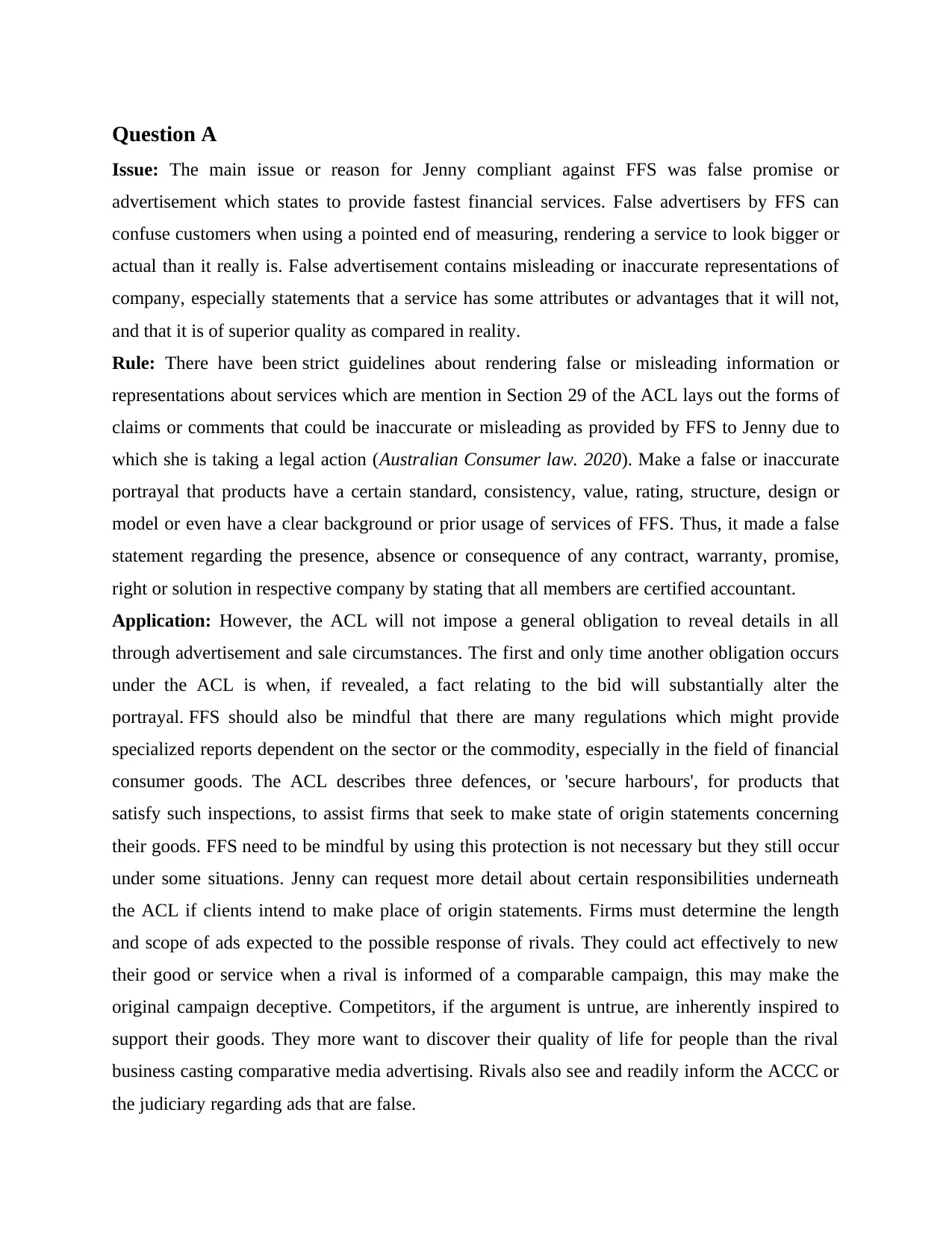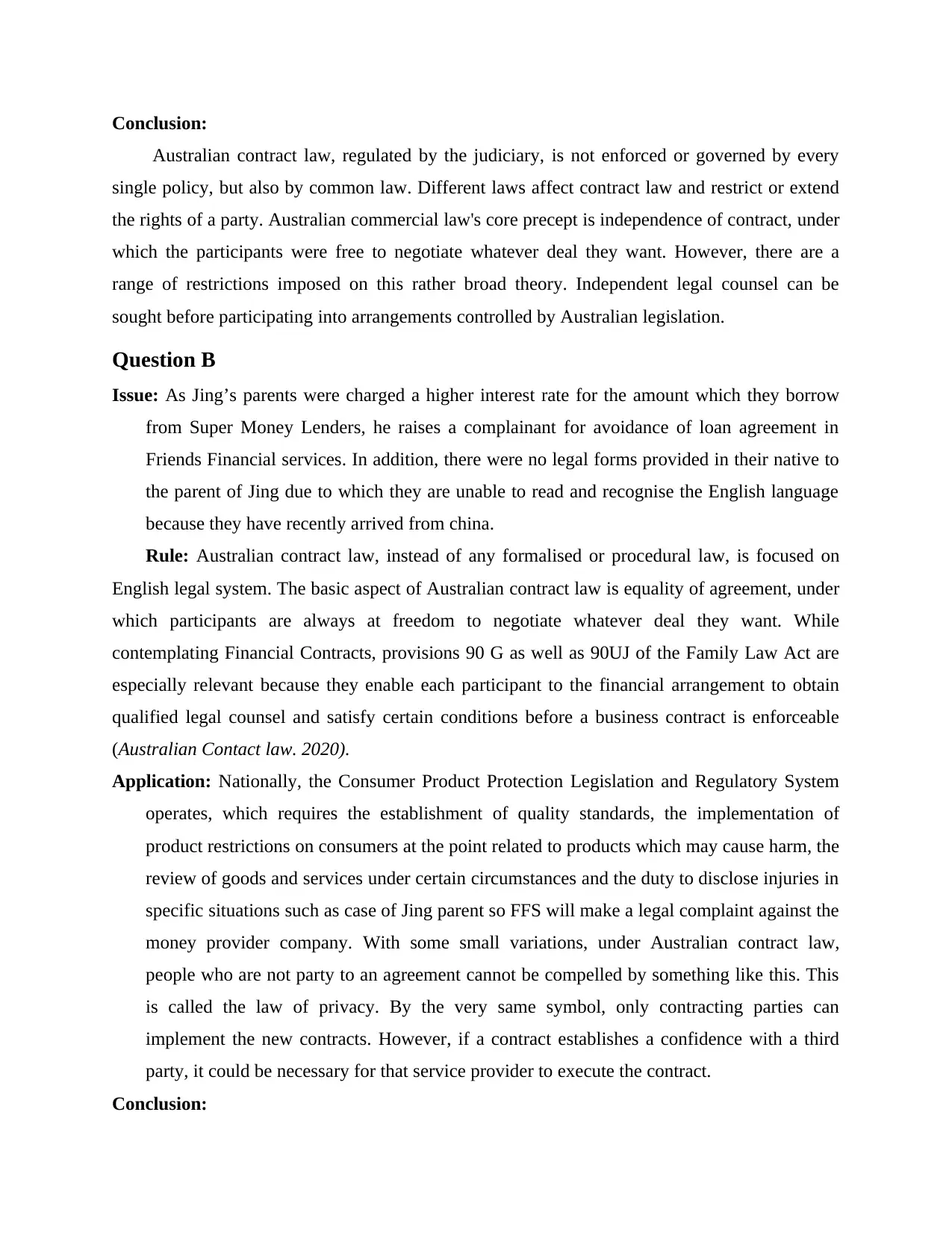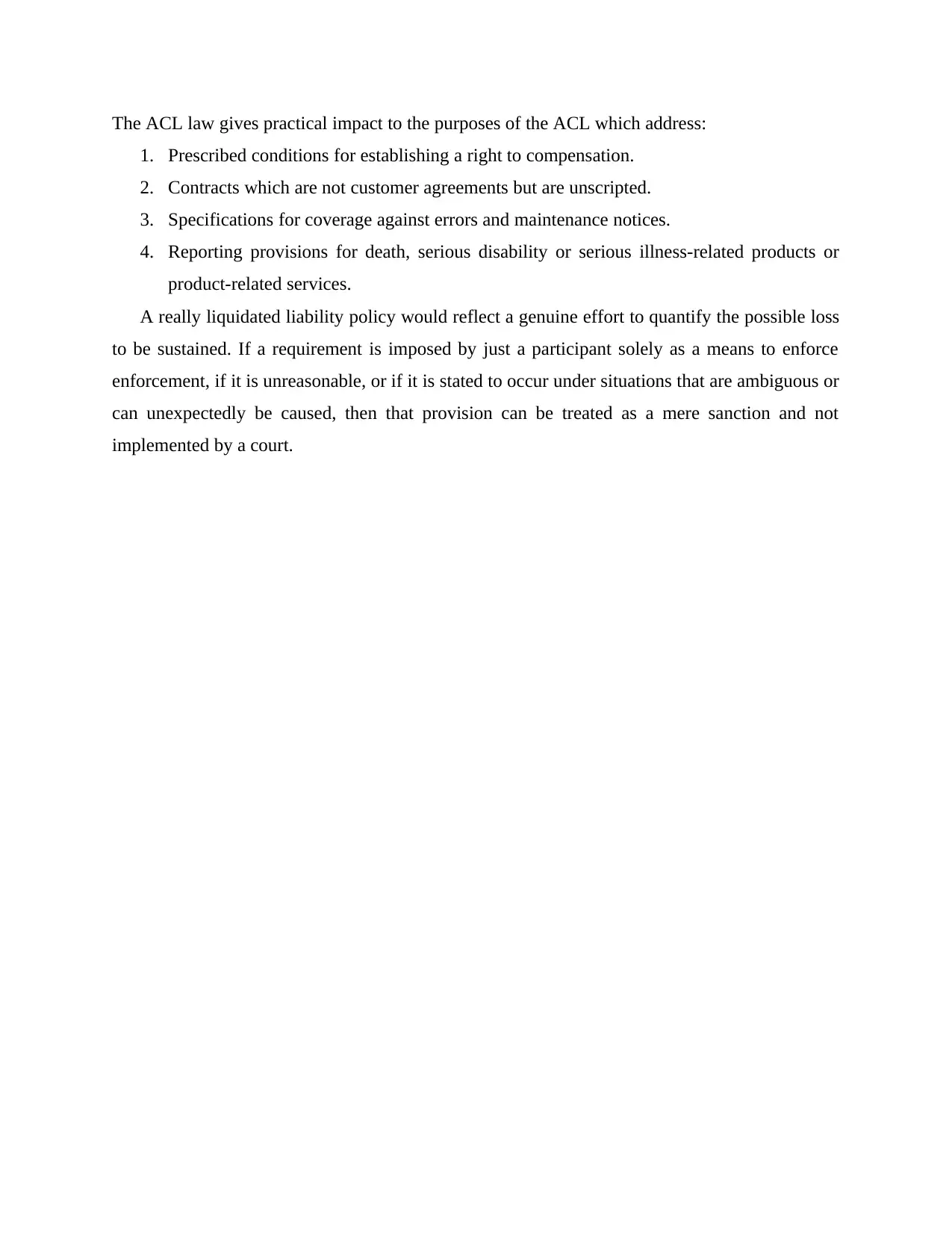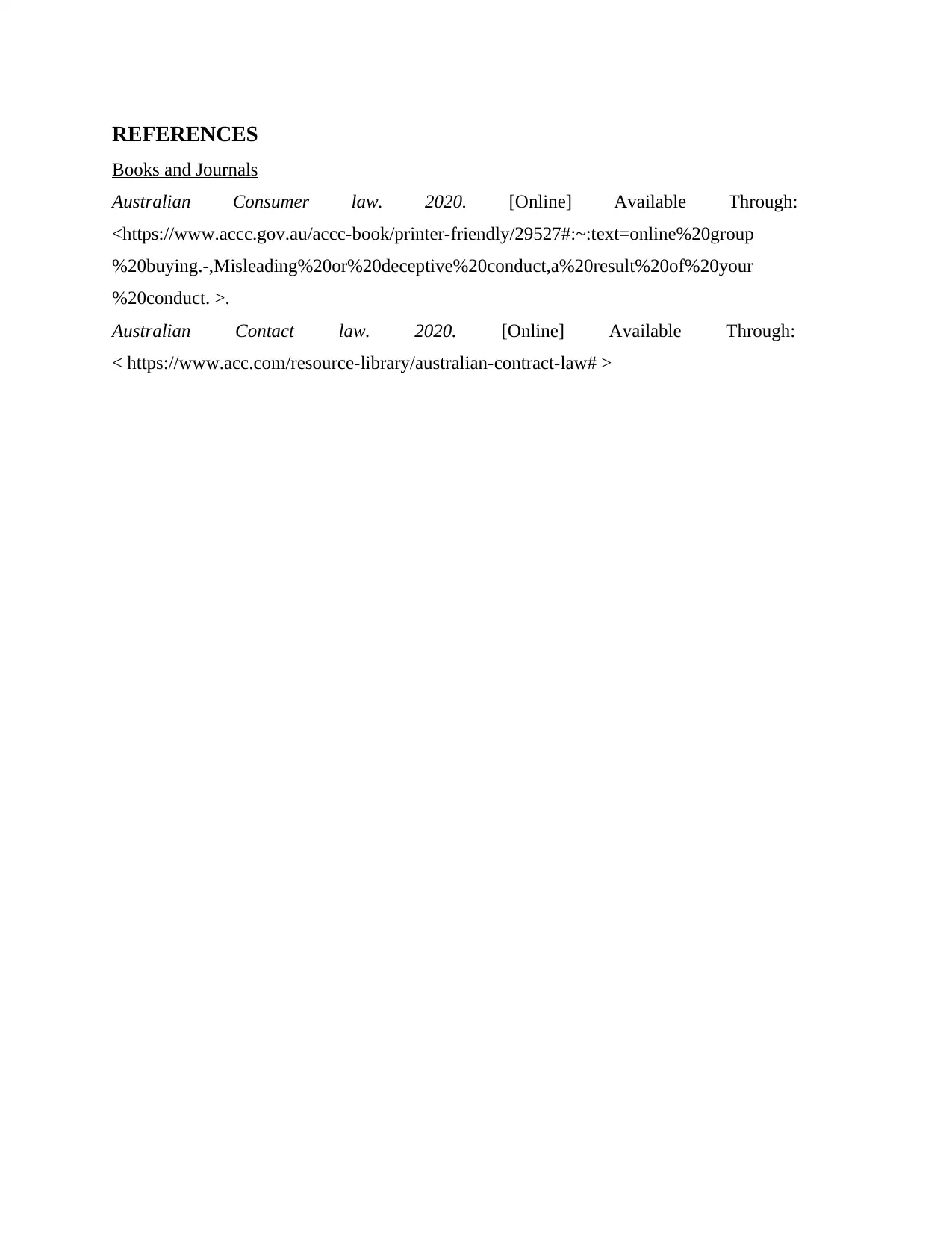Friends Financial Services (FFS) Case Study: Legal Issues Analysis
VerifiedAdded on 2023/01/06
|5
|1125
|82
Case Study
AI Summary
This case study analyzes two legal issues faced by Friends Financial Services (FFS) using the IRAC method. The first issue involves a customer complaint against FFS for false advertising, focusing on misleading representations of service quality and the application of the Australian Consumer Law (ACL). The second issue concerns a loan agreement dispute, where Jing's parents were charged a higher interest rate and lacked legal forms in their native language, raising questions about contract validity and consumer protection under Australian contract law. The analysis examines relevant laws, including the ACL and the Family Law Act, and their application to the scenarios, providing a comprehensive legal assessment of the issues and potential outcomes.

Project
Paraphrase This Document
Need a fresh take? Get an instant paraphrase of this document with our AI Paraphraser

Question A
Issue: The main issue or reason for Jenny compliant against FFS was false promise or
advertisement which states to provide fastest financial services. False advertisers by FFS can
confuse customers when using a pointed end of measuring, rendering a service to look bigger or
actual than it really is. False advertisement contains misleading or inaccurate representations of
company, especially statements that a service has some attributes or advantages that it will not,
and that it is of superior quality as compared in reality.
Rule: There have been strict guidelines about rendering false or misleading information or
representations about services which are mention in Section 29 of the ACL lays out the forms of
claims or comments that could be inaccurate or misleading as provided by FFS to Jenny due to
which she is taking a legal action (Australian Consumer law. 2020). Make a false or inaccurate
portrayal that products have a certain standard, consistency, value, rating, structure, design or
model or even have a clear background or prior usage of services of FFS. Thus, it made a false
statement regarding the presence, absence or consequence of any contract, warranty, promise,
right or solution in respective company by stating that all members are certified accountant.
Application: However, the ACL will not impose a general obligation to reveal details in all
through advertisement and sale circumstances. The first and only time another obligation occurs
under the ACL is when, if revealed, a fact relating to the bid will substantially alter the
portrayal. FFS should also be mindful that there are many regulations which might provide
specialized reports dependent on the sector or the commodity, especially in the field of financial
consumer goods. The ACL describes three defences, or 'secure harbours', for products that
satisfy such inspections, to assist firms that seek to make state of origin statements concerning
their goods. FFS need to be mindful by using this protection is not necessary but they still occur
under some situations. Jenny can request more detail about certain responsibilities underneath
the ACL if clients intend to make place of origin statements. Firms must determine the length
and scope of ads expected to the possible response of rivals. They could act effectively to new
their good or service when a rival is informed of a comparable campaign, this may make the
original campaign deceptive. Competitors, if the argument is untrue, are inherently inspired to
support their goods. They more want to discover their quality of life for people than the rival
business casting comparative media advertising. Rivals also see and readily inform the ACCC or
the judiciary regarding ads that are false.
Issue: The main issue or reason for Jenny compliant against FFS was false promise or
advertisement which states to provide fastest financial services. False advertisers by FFS can
confuse customers when using a pointed end of measuring, rendering a service to look bigger or
actual than it really is. False advertisement contains misleading or inaccurate representations of
company, especially statements that a service has some attributes or advantages that it will not,
and that it is of superior quality as compared in reality.
Rule: There have been strict guidelines about rendering false or misleading information or
representations about services which are mention in Section 29 of the ACL lays out the forms of
claims or comments that could be inaccurate or misleading as provided by FFS to Jenny due to
which she is taking a legal action (Australian Consumer law. 2020). Make a false or inaccurate
portrayal that products have a certain standard, consistency, value, rating, structure, design or
model or even have a clear background or prior usage of services of FFS. Thus, it made a false
statement regarding the presence, absence or consequence of any contract, warranty, promise,
right or solution in respective company by stating that all members are certified accountant.
Application: However, the ACL will not impose a general obligation to reveal details in all
through advertisement and sale circumstances. The first and only time another obligation occurs
under the ACL is when, if revealed, a fact relating to the bid will substantially alter the
portrayal. FFS should also be mindful that there are many regulations which might provide
specialized reports dependent on the sector or the commodity, especially in the field of financial
consumer goods. The ACL describes three defences, or 'secure harbours', for products that
satisfy such inspections, to assist firms that seek to make state of origin statements concerning
their goods. FFS need to be mindful by using this protection is not necessary but they still occur
under some situations. Jenny can request more detail about certain responsibilities underneath
the ACL if clients intend to make place of origin statements. Firms must determine the length
and scope of ads expected to the possible response of rivals. They could act effectively to new
their good or service when a rival is informed of a comparable campaign, this may make the
original campaign deceptive. Competitors, if the argument is untrue, are inherently inspired to
support their goods. They more want to discover their quality of life for people than the rival
business casting comparative media advertising. Rivals also see and readily inform the ACCC or
the judiciary regarding ads that are false.

Conclusion:
Australian contract law, regulated by the judiciary, is not enforced or governed by every
single policy, but also by common law. Different laws affect contract law and restrict or extend
the rights of a party. Australian commercial law's core precept is independence of contract, under
which the participants were free to negotiate whatever deal they want. However, there are a
range of restrictions imposed on this rather broad theory. Independent legal counsel can be
sought before participating into arrangements controlled by Australian legislation.
Question B
Issue: As Jing’s parents were charged a higher interest rate for the amount which they borrow
from Super Money Lenders, he raises a complainant for avoidance of loan agreement in
Friends Financial services. In addition, there were no legal forms provided in their native to
the parent of Jing due to which they are unable to read and recognise the English language
because they have recently arrived from china.
Rule: Australian contract law, instead of any formalised or procedural law, is focused on
English legal system. The basic aspect of Australian contract law is equality of agreement, under
which participants are always at freedom to negotiate whatever deal they want. While
contemplating Financial Contracts, provisions 90 G as well as 90UJ of the Family Law Act are
especially relevant because they enable each participant to the financial arrangement to obtain
qualified legal counsel and satisfy certain conditions before a business contract is enforceable
(Australian Contact law. 2020).
Application: Nationally, the Consumer Product Protection Legislation and Regulatory System
operates, which requires the establishment of quality standards, the implementation of
product restrictions on consumers at the point related to products which may cause harm, the
review of goods and services under certain circumstances and the duty to disclose injuries in
specific situations such as case of Jing parent so FFS will make a legal complaint against the
money provider company. With some small variations, under Australian contract law,
people who are not party to an agreement cannot be compelled by something like this. This
is called the law of privacy. By the very same symbol, only contracting parties can
implement the new contracts. However, if a contract establishes a confidence with a third
party, it could be necessary for that service provider to execute the contract.
Conclusion:
Australian contract law, regulated by the judiciary, is not enforced or governed by every
single policy, but also by common law. Different laws affect contract law and restrict or extend
the rights of a party. Australian commercial law's core precept is independence of contract, under
which the participants were free to negotiate whatever deal they want. However, there are a
range of restrictions imposed on this rather broad theory. Independent legal counsel can be
sought before participating into arrangements controlled by Australian legislation.
Question B
Issue: As Jing’s parents were charged a higher interest rate for the amount which they borrow
from Super Money Lenders, he raises a complainant for avoidance of loan agreement in
Friends Financial services. In addition, there were no legal forms provided in their native to
the parent of Jing due to which they are unable to read and recognise the English language
because they have recently arrived from china.
Rule: Australian contract law, instead of any formalised or procedural law, is focused on
English legal system. The basic aspect of Australian contract law is equality of agreement, under
which participants are always at freedom to negotiate whatever deal they want. While
contemplating Financial Contracts, provisions 90 G as well as 90UJ of the Family Law Act are
especially relevant because they enable each participant to the financial arrangement to obtain
qualified legal counsel and satisfy certain conditions before a business contract is enforceable
(Australian Contact law. 2020).
Application: Nationally, the Consumer Product Protection Legislation and Regulatory System
operates, which requires the establishment of quality standards, the implementation of
product restrictions on consumers at the point related to products which may cause harm, the
review of goods and services under certain circumstances and the duty to disclose injuries in
specific situations such as case of Jing parent so FFS will make a legal complaint against the
money provider company. With some small variations, under Australian contract law,
people who are not party to an agreement cannot be compelled by something like this. This
is called the law of privacy. By the very same symbol, only contracting parties can
implement the new contracts. However, if a contract establishes a confidence with a third
party, it could be necessary for that service provider to execute the contract.
Conclusion:
⊘ This is a preview!⊘
Do you want full access?
Subscribe today to unlock all pages.

Trusted by 1+ million students worldwide

The ACL law gives practical impact to the purposes of the ACL which address:
1. Prescribed conditions for establishing a right to compensation.
2. Contracts which are not customer agreements but are unscripted.
3. Specifications for coverage against errors and maintenance notices.
4. Reporting provisions for death, serious disability or serious illness-related products or
product-related services.
A really liquidated liability policy would reflect a genuine effort to quantify the possible loss
to be sustained. If a requirement is imposed by just a participant solely as a means to enforce
enforcement, if it is unreasonable, or if it is stated to occur under situations that are ambiguous or
can unexpectedly be caused, then that provision can be treated as a mere sanction and not
implemented by a court.
1. Prescribed conditions for establishing a right to compensation.
2. Contracts which are not customer agreements but are unscripted.
3. Specifications for coverage against errors and maintenance notices.
4. Reporting provisions for death, serious disability or serious illness-related products or
product-related services.
A really liquidated liability policy would reflect a genuine effort to quantify the possible loss
to be sustained. If a requirement is imposed by just a participant solely as a means to enforce
enforcement, if it is unreasonable, or if it is stated to occur under situations that are ambiguous or
can unexpectedly be caused, then that provision can be treated as a mere sanction and not
implemented by a court.
Paraphrase This Document
Need a fresh take? Get an instant paraphrase of this document with our AI Paraphraser

REFERENCES
Books and Journals
Australian Consumer law. 2020. [Online] Available Through:
<https://www.accc.gov.au/accc-book/printer-friendly/29527#:~:text=online%20group
%20buying.-,Misleading%20or%20deceptive%20conduct,a%20result%20of%20your
%20conduct. >.
Australian Contact law. 2020. [Online] Available Through:
< https://www.acc.com/resource-library/australian-contract-law# >
Books and Journals
Australian Consumer law. 2020. [Online] Available Through:
<https://www.accc.gov.au/accc-book/printer-friendly/29527#:~:text=online%20group
%20buying.-,Misleading%20or%20deceptive%20conduct,a%20result%20of%20your
%20conduct. >.
Australian Contact law. 2020. [Online] Available Through:
< https://www.acc.com/resource-library/australian-contract-law# >
1 out of 5
Related Documents
Your All-in-One AI-Powered Toolkit for Academic Success.
+13062052269
info@desklib.com
Available 24*7 on WhatsApp / Email
![[object Object]](/_next/static/media/star-bottom.7253800d.svg)
Unlock your academic potential
Copyright © 2020–2026 A2Z Services. All Rights Reserved. Developed and managed by ZUCOL.





